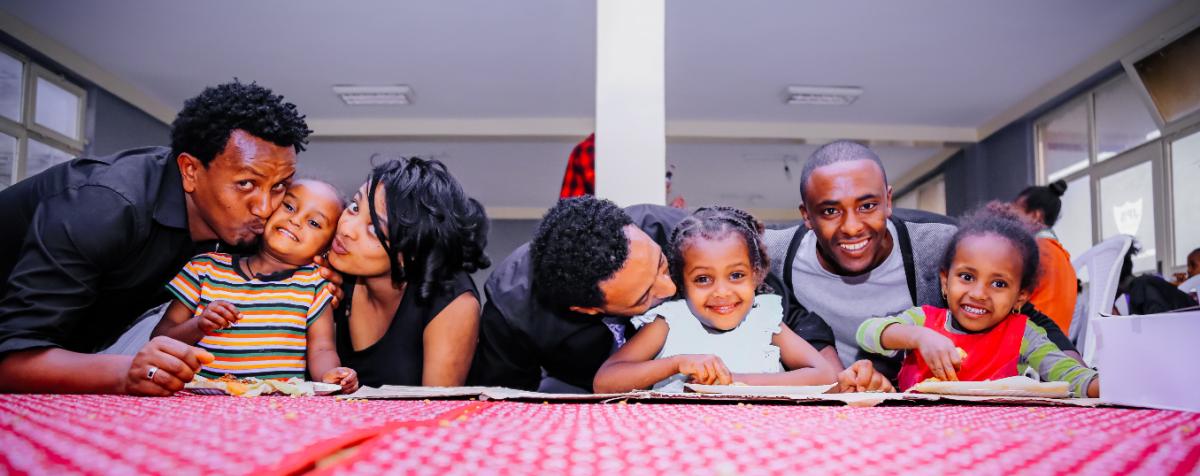Social Justice
We stand in solidarity with those who have been and continue to be harmed by racist, ableist, and colonialist views, actions, policies, and practices. We seek to disrupt inequity by challenging ourselves and others to develop and act with an equity lens in our efforts to support socially responsible learning environments and outcomes for young children.
Our Commitment
The Marsico Institute for Early Learning, along with our colleagues at the University of Denver, stands with the Black and Indigenous community against hate and racism in all its forms, including ongoing police brutality. In addition to the loss of Black lives at the hands of those charged with protecting lives, we are broken-hearted by the tragedy of higher infant and maternal mortality rates experienced by Black families, as well as the disproportionate number of Black children who are suspended and/or expelled from settings that are supposed to provide care and education. We condemn this damage done to Black children and families and recognize that these structural inequities in power are intertwined with all forms of social injustice.
We also recognize the damage done to children and families by higher parental incarceration rates due to over-policing and systemic racism within the criminal justice system that impact communities of color, cruel detention policies of border enforcement, lives lost in native communities that lack healthy living conditions, disparities in access to health care experienced by people of color, the disproportionate impact of COVID-19 on Black and Latine communities, and lives pained by racist ideas being spread about the global pandemic.
These realities challenge us to deepen our commitment to diversity, equity, inclusion, and accessibility. This commitment includes intentionally representing diversity in our studies, engaging in university efforts toward Inclusive Excellence, and participating in initiatives that build on and expand high-quality care and education in marginalized communities. We also seek to further our understanding of the reach and many manifestations of racism and ableism to inform the development of effective practices and policies to guide our work.
We will continue to build our collective understanding and empathy through readings, research, and critical reflection on the impact of our own practices. We commit to challenging outdated ways of thinking that do not represent anti-racist and anti-ableist approaches to caring for and educating young children and respectfully engaging diverse families. We will continue to seek out diverse voices to help us develop as a research institute while amplifying these voices within our field. We will improve our organizational efforts to learn from and support people of different abilities, races, ethnicities, languages, genders, and cultures in our production of activities for young children, professional development experiences, development of inclusive organizational policies and processes, design of research studies, and analysis and interpretation of research data.
We have an obligation as researchers and teacher educators to make clear that children who have been historically marginalized deserve high-quality, research-informed educational experiences. We acknowledge that equity will include additional investments in historically marginalized communities, supporting children and families in culturally responsive ways. We commit to joining the long and difficult road of creating more equitable systems and ways of thinking, particularly in our primary field of education.
In our desire to act as Allies and Accomplices, we acknowledge the need for these actions, while also acknowledging that this is not enough; that our long-term dedication will need to be informed from listening ,learning from, and working with our community. Through internal and external work, we ally ourselves with all who are working to dismantle systems of bias that privilege learning opportunities for specific groups. These efforts align with our ongoing work to support equity in early childhood.
In solidarity and strength,
The Marsico Institute for Early Learning
- Douglas H. Clements, PhD
- Co-Executive Director
- Julie Sarama, PhD
- Co-Executive Director
- Crystal Day-Hess, PhD
- Assistant Research Professor, Assistant Director
- Kim Munnerley
- Business Coordinator
- Christina Mulcahy, PhD
- Senior Research Associate
- Shannon Stark Guss, PhD
- Senior Research Associate
- Daniela Alvarez-Vargas
- Post Doctoral Research Fellow
- Emily Thumann
- Research Associate
Publications Addressing Diversity, Equity, and Inclusion in Early STEM
-
Building Learning Trajectories for Intentional, Inclusive, and Individualized Instructional Experiences in STEM
Guss, S. S., Lim, C.-I., Clements, D. H., Sharifnia, E. B., Holland, A. L., Vinh, M., & Sarama, J. (2024). Building Learning Trajectories for Intentional, Inclusive, and Individualized Instructional Experiences in STEM. Education Sciences, 14(1), Article 1. https://doi.org/10.3390/educsci14010008
-
Designing Inclusive Computational Thinking Learning Trajectories for the Youngest Learners
Guss, S. S., Clements, D. H., Sharifnia, E., Sarama, J., Holland, A., Lim, C.-I., & Vinh, M. (2024). Designing Inclusive Computational Thinking Learning Trajectories for the Youngest Learners. Education Sciences, 14(7), Article 7. https://doi.org/10.3390/educsci14070733
-
Equity within Mathematics Education Research as a Political Act
Aguirre, J., Herbel-Eisenmann, B. A., Celedón-Pattichis, S., Civil, M., Wilkerson, T., Stephan, M., Pape, S., Clements, D. H. (2017). Equity within mathematics education research as a political act: Moving from choice to intentional collective professional responsibility. Journal for Research in Mathematics Education, 48(2), 124–147
-
Asset-based Approaches to Equitable Mathematics Education Research and Practice
Celedón-Pattichis, S., Peters, S. A., Borden, L. L., Males, J. R., Pape, S. J., Chapman, O., Clements, D. H., & Leonard, J. (2018). Asset-based approaches to equitable mathematics education research and practice. Journal for Research in Mathematics Education, 49(4), 373–389. doi:10.5951/jresematheduc.49.4.037
-
Positioning Mathematics Education Researchers to Influence Storylines
Herbel-Eisenmann, B. A., Sinclair, N., Chval, K. B., Wanko, J. J., Clements, D. H., Civil, M., Pape, S. J., Stephan, M., Wanko, J., Wilkerson, T. L. (2016). Positioning mathematics education researchers to influence storylines. Journal for Research in Mathematics Education, 47(2), 102–117.
